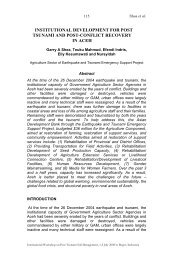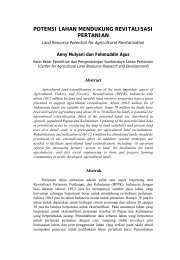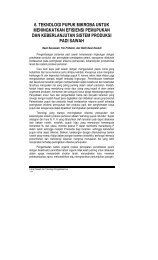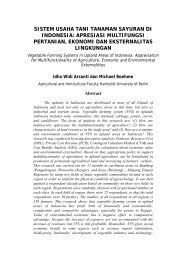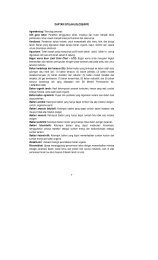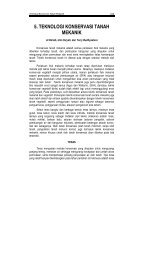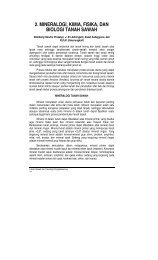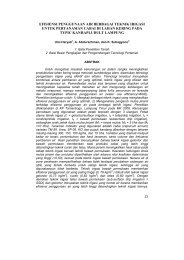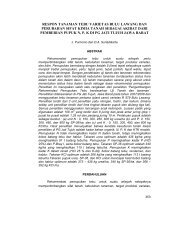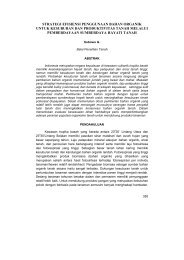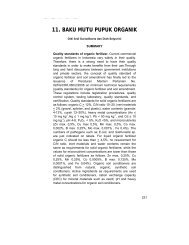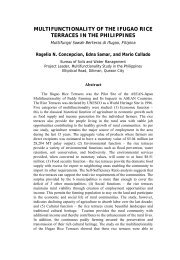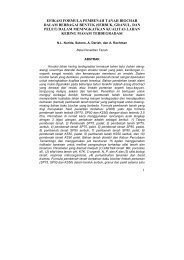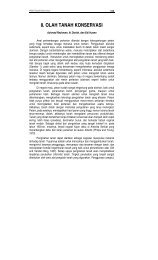Proceedings - Balai Penelitian Tanah
Proceedings - Balai Penelitian Tanah
Proceedings - Balai Penelitian Tanah
Create successful ePaper yourself
Turn your PDF publications into a flip-book with our unique Google optimized e-Paper software.
87<br />
Mohan GMC<br />
The successful first year’s reclamation effort is the result of joint efforts<br />
with the government complementing their work and package and<br />
reclamation of all tsunami affected lands and farmers (irrespective of<br />
type and category) through an effective participative co-ordination<br />
mechanism.<br />
2. II YEAR (2006-2007): FROM CROP MANAGEMENT TO<br />
FARMING SYSTEMS MANAGEMENT<br />
Soil salinity, being a persistent problem of this area (through seepage,<br />
back water intrusion) needed a long-term management strategy.<br />
There were also fears of capillary rise of temporarily percolated salts<br />
during the following summer once the surface soils dried up. One of<br />
the most significant factors which can favourably change soil salinity<br />
considerably in the longer run is improved soil fertility status. Besides<br />
changing the salinity, the increased soil fertility also means<br />
improvement in the physical, chemical and biological properties of soil<br />
as well as crop productivity and farm income. Hence there was a<br />
definite need to continue the reclamation efforts to a limited extend in<br />
the second year simultaneously addressing the soil fertility.<br />
In the second season, it was envisaged that a set of simple farming<br />
systems should emerge in each of the farm. This means that the<br />
predominantly existing ‘crop’ system (field crops) should further be<br />
diversified, and the ‘tree’ system (biomass/horticulture/forestry) should<br />
be developed and the ‘livestock’ system should be strengthened and<br />
enlarged. Apart from these three systems proposed, other relevant<br />
site-specific farming systems (enterprises) were added upon needbased.<br />
Hence in the 2 nd season broad-basing the interventions on the<br />
farm took place keeping productivity and sustainability of the farm in<br />
the mind. Capacity building of the farming community and ensuring<br />
their participation in all the interventions taken up were the thrust<br />
areas. In a nutshell, the reclamation measures were integrated into<br />
the regular crop management practices along with further<br />
diversification of the farm leading to sustainability.<br />
Simultaneously, a four month study on ‘Understanding Vulnerabilities<br />
of Agricultural Communities to Frequent Disasters and their coping<br />
mechanisms’ was taken up and the findings of this study were<br />
presented in the ‘National Workshop on Disaster Preparedness in<br />
Agriculture’ organized by NCRC. This workshop helped not only to<br />
share experiences and learning about tsunamis, but also on managing<br />
floods, droughts and cyclone from elsewhere in India. Following this<br />
workshop, a six month ‘Study on coastal water bodies in<br />
Nagapattinam’ was completed to take stock off-farm drainage related<br />
problems related to salinity and floods.<br />
International Workshop on Post Tsunami Soil Management, 1-2 July 2008 in Bogor, Indonesia



